The complete in-depth briefing from political risk analysts Maplecroft on Libya risks for business and investors in the post-Gaddafi era

- Libya’s rebel movement declared that it had taken control of between 80% and 85% of Tripoli on the morning of 22 August 2011. Pockets of resistance remain and rebels continue to battle Gaddafi loyalists in the capital. Although Gaddafi loyalists are proving more resilient than initially expected following the rebels’ announcement that they had taken control of most of the capital, the former are unlikely to be able to sustain their position in the long term. Although Colonel Gaddafi’s whereabouts has yet to be identified, his rule has effectively ended after a gruelling six month struggle.
- Libya’s future is nonetheless far from certain. The prospect of increased friction or violent conflict between the country’s tribes, clans and ethnic groups (specifically between the Arabs and Berbers) remains a serious source of concern. In addition, the general absence of formal structures through which to govern poses another challenge. The analysis below provides an in-depth breakdown of the political and business risks faced by investors in a post-Gaddafi Libya.
Factionalism and division
- Tribal, ethnic, ideological and religious rivalries and divisions constitute a large risk for Libya as members of the opposition movement seek to take over the reins of control. In addition to Berbers and Arabs, the rebel movement includes a disparate mix of liberal secularists, Islamists, socialists, former regime loyalists and long-time opposition figures. The potential for individual or group interests to precipitate violence between the constituent parts of the opposition movement was most apparent in July when rebel commander Abdel Fatah Younes was assassinated. Some rebels claim that he was killed by an Islamist militia allied to the rebel’s National Transitional Council (NTC) due to his association with the Gaddafi regime. Others assert he was killed by members of his own tribe who opposed his formal defection. Significantly, Gaddafi’s ousting may remove an all-essential common objective which has until now largely held factions of the opposition together in an uneasy alliance.
- Failure to bridge the differences between the disparate elements of the NTC and other members of the rebel movement could lead to the emergence of new autocratic and authoritarian leaders. A large-scale fallout between different groups followed by sustained or escalating violence could also precipitate the eventual breakup of Libya. At a local level, the lack of stability and failure to put in place effective law-enforcement measures may encourage looting and damage to private and public property. The NTC has acknowledged this risk and urged Libyans to respect property rights.
- On a more positive note, it is not altogether inconceivable that the relative level of cohesion developed between anti-Gaddafi fighters in their drive to topple Gaddafi will help deter them from locking horns indefinitely. Optimists hope that the inclusion of former Gaddafi aides in the rebel camp will give rise to conciliation with current loyalists and facilitate the emergence of an inclusive political system in the future. The same, of course, cannot be said of current-day Iraq, where former members of the Ba’ath party are essentially banned from politics.
- The absence of a central figure from the NTC who enjoys the unreserved support of all tribes, factions and groups nonetheless remains a chief source of concern. NTC Chairman Mustafa Abdul Jalil was formerly Gaddafi’s justice minister, although he was the first member of the cabinet to resign in February 2011 due to the state’s use of excessive force against unarmed protesters. Jalil was considered to be one of the least beholden to the regime when serving as minister and commands the respect of many rebels and non-combatants. Yet, his former position in Gaddafi’s inner circle means that he will continue to be mistrusted by other members of the rebel movement. The lack of a central figure around which different tribes, clans and ethnic groups can gather in solidarity remains an ongoing concern.
- Libya’s lack of a cohesive civil society and its lack of democratic tradition will make the run-up to scheduled elections hazardous. Colonel Gaddafi ruled Libya through a combination of fear and patronage with power effectively vested in his own hands. Though his Qadhadhfa tribe is small (numbering merely 100,000), Gaddafi developed a strong patronage network that included the Warfalla, Magarha, Warshafana and Tarhuna groupings. As such, the country was ruled almost without traditional government institutions. Putting effective structures of governance along with necessary checks and balances in place will take time.
- Ongoing international political and economic support will be important if the NTC is to make headway in developing a representative form of government in Tripoli. On 10 August, the NTC announced that a new interim government would be formed 30 days following Gaddafi’s removal from power. An electoral law will be published 90 days following Gaddafi’s ouster and congressional elections would be held 240 days following the collapse of the regime. A referendum is also on the cards for a new constitution. The NTC’s current draft constitution is a liberal document which promises political inclusion although Islamic jurisprudence will be the primary source of legislation. While regional and Western powers are in no position to dictate Libya’s future, they can help steer the country in the right direction by providing incentives and political channels for engagement and mediation between political groups if and when the need arises.
Revenge attacks and the risk posed by militant Islam
- It is not inconceivable that Gaddafi loyalists will continue to resist political change through violence. As the rebels entered the capital, reports emerged of entire units taking flight while supporters reportedly stripped off their uniforms. While many Gaddafi supporters may seek to integrate into the new order, hard-core loyalists may seek to frustrate the political transition through attacks.
- Conversely, Libyans who have been subjected to abuse under the Gaddafi regime may seek to exact revenge against loyalists in the aftermath of Gaddafi’s ouster. That said, the thousands of rebels who flooded Tripoli’s streets have reportedly refrained from engaging in large-scale retaliatory attacks against unarmed Gaddafi loyalists.
- The NTC is thought to have downplayed the risk posed by jihadists in Libya partly in a bid to reduce fears of ally-supplied arms falling into the wrong hands. Yet, the risk posed by al-Qaeda in the Islamic Maghreb (AQIM) currently and in the months to come should not be understated. In April, a senior Algerian official warned that AQAP was acquiring surface-to-air missiles in Libya and smuggling them to Mali. AQAP is likely to exploit further turmoil in Libya. If instability persists it may seek to establish a strong foothold in the country while acquiring weaponry.
Investment landscape
- Although Libya’s future is uncertain, the political leadership of the rebels has sought to reassure investors about Libya’s future business landscape. BP, which evacuated its staff from the country in February, has confirmed that it will resume activities and “return to the country when conditions allow.” Oil and gas services company Petrofac has also indicated that it was keen to send employees to the country by the end of 2012 to examine business options in the country. Reports also indicate that staff from oil and gas major Eni are in the country and are looking to recommence operations.
- Firms from countries that provided continuous and strong support to the rebel movement may find themselves in a better position to secure future business. France and the UK lobbied hard for the passage of UN Security Council Resolution 1973 which effectively authorised a no-fly zone over Libya. Many firms from these countries now find themselves in an advantageous position versus other foreign competitors.
- The position of investors from countries that have been more reluctant to place their full weight behind the rebel movement or did so more recently is more tenuous, however. China, which has increased its engagement with Libyan rebels over recent months, has iterated its support for the Libyan people. It previously abstained from voting for UNSC Resolution 1973, however. Rebel leaders have promised to honour all the business contracts that were signed between investors and the Gaddafi regime in Libya and even requested Beijing’s assistance in the reconstruction process. Yet Mustafa Jalil maintains that the NTC would favour governments which extended their support to the rebel movement over those which did not, placing China and Russia in an ambiguous position.
- In the case that Libya does witness a relatively smooth transition to a more representative and transparent form of government, contracts signed under Gaddafi are likely to come under scrutiny. Maplecroft’s Business Integrity and Corruption Index ranks Libya as an extreme risk country with a score of 2.08 out of 10, where scores closer to zero indicate higher risk. The NTC’s Mustafa Jalil said in July that all agreements and contracts signed with the previous government would be respected on the condition that they “have nothing to do with corrupt schemes.” Companies that have engaged in corrupt practices or have engaged with corrupt partners risk losing their foothold in the country. At a minimum they are likely to be subjected to negative publicity.





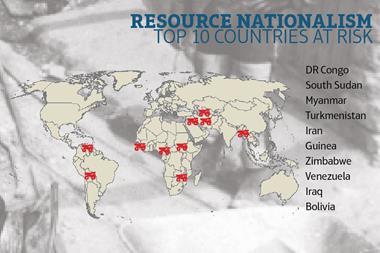
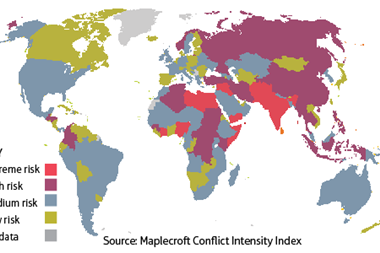
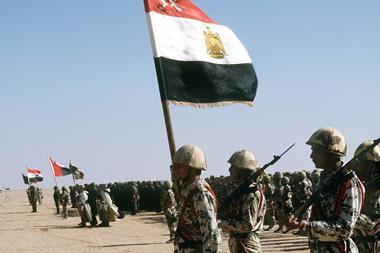
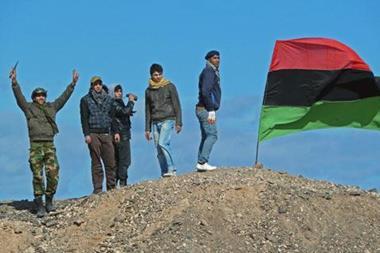
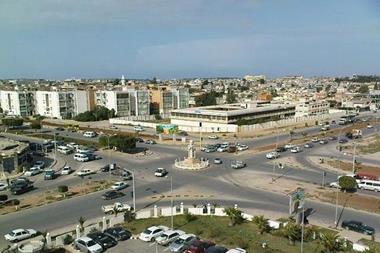










No comments yet